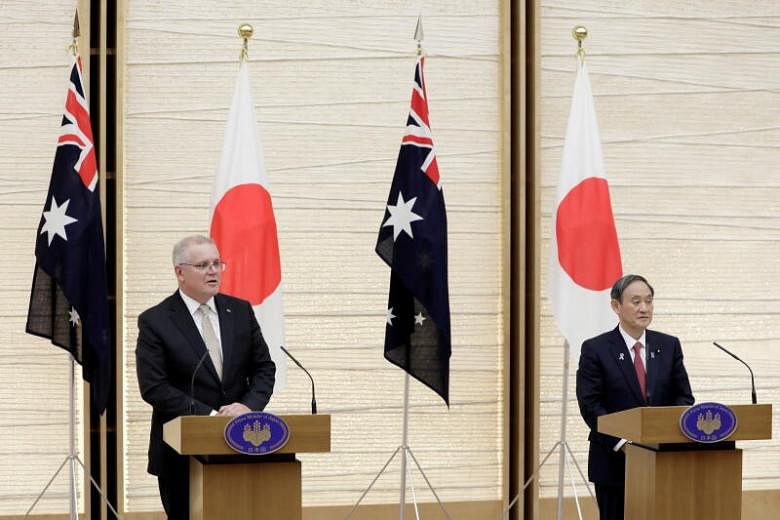TOKYO (THE YOMIURI SHIMBUN/ASIA NEWS NETWORK) - To maintain regional peace and prosperity, it is essential to protect maritime freedom based on international law.
Japan, together with Australia, needs to contribute further to the maintenance of order.
Prime Minister Yoshihide Suga met his Australian counterpart Scott Morrison in Tokyo and agreed to strengthen security cooperation. It was the first summit meeting that Mr Suga has held with a foreign leader in Japan.
The two leaders also confirmed that their countries would cooperate in such fields as the economy and novel coronavirus measures.
While China continues its aggressive maritime expansion in the East China Sea and the South China Sea, the United States, which is going through a leadership transition, has no clear diplomatic strategy.
Amid concerns over a "power vacuum" in Asia, it is significant that the leaders of Japan and Australia met face to face and made clear their intention to cooperate on security issues.
At the meeting, Mr Suga said he wanted to confirm that the two countries would strengthen cooperation to realise the "free and open Indo-Pacific" vision.
A joint statement signed by the two leaders stated that they have reached a broad agreement on a bilateral reciprocal access agreement, including a joint exercise between the Self-Defence Forces and the Australian military. This is the first time Japan has concluded such an agreement.
The agreement, which sets out the legal status of temporary operations in each other's countries, is said to include tariff exemptions on goods carried by personnel and simplify procedures for bringing in weapons.
It is worth considering concluding such an agreement with Britain and other friendly nations.
After the 2011 Great East Japan Earthquake, the Australian military implemented support activities in the affected areas.
The procedures for the agreement to enter into force should be expedited so that joint exercises and disaster relief operations can be conducted effectively.
The leaders also agreed to expedite coordination for adding Australia to the list of nations subject to the Self-Defence Forces Law concerning the protection of weapons and other equipment of foreign countries' units, under which warships and aircraft can be protected by the Self-Defence Force.
Australia would be the second such country on the list, following the United States.
This year, Australia participated in a joint naval exercise with the US Navy, the Indian Navy and the Maritime Self-Defence Force.
To keep China's self-serving activities in check, it is important for Japan, the United States, Australia and India, which share such values as the rule of law and democracy, to unite.
A joint statement including maritime security cooperation was also adopted at the summit meeting of Japan and the Association of Southeast Asian Nations (Asean) held online on Nov 12.
China, which objected to the "free and open Indo-Pacific" vision, calling it an outdated Cold War way of thinking, is off the mark.
China's self-serving actions of turning the South China Sea into a military stronghold is primarily what made other countries aware of the importance of principles such as the freedom of navigation.
The role of the United States, in terms of both diplomacy and military, is important for stability in the Indo-Pacific region.
Japan must take concerted action with other countries concerned and urge the United States to become more actively involved in the region.
The Yomiuri Shimbun is a member of The Straits Times media partner Asia News Network, an alliance of 24 news media organisations.

